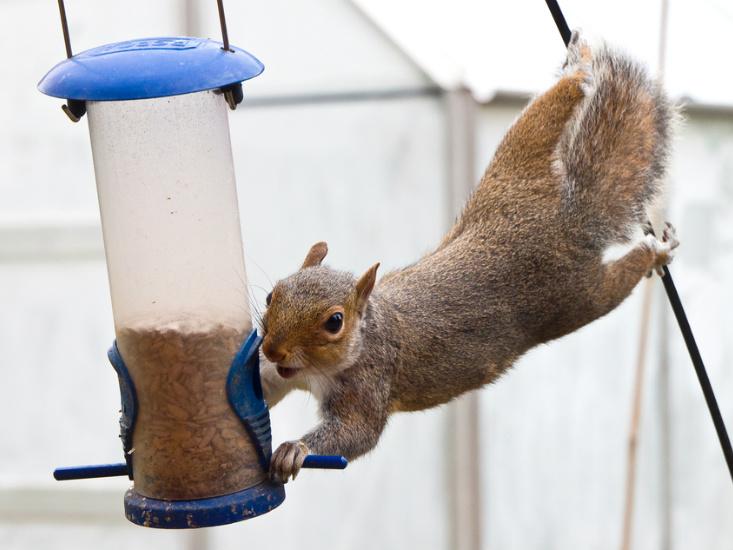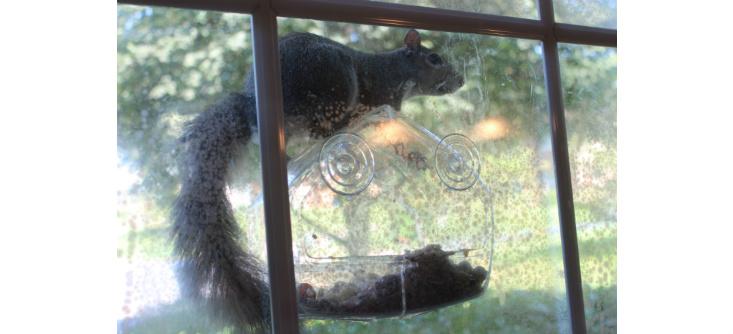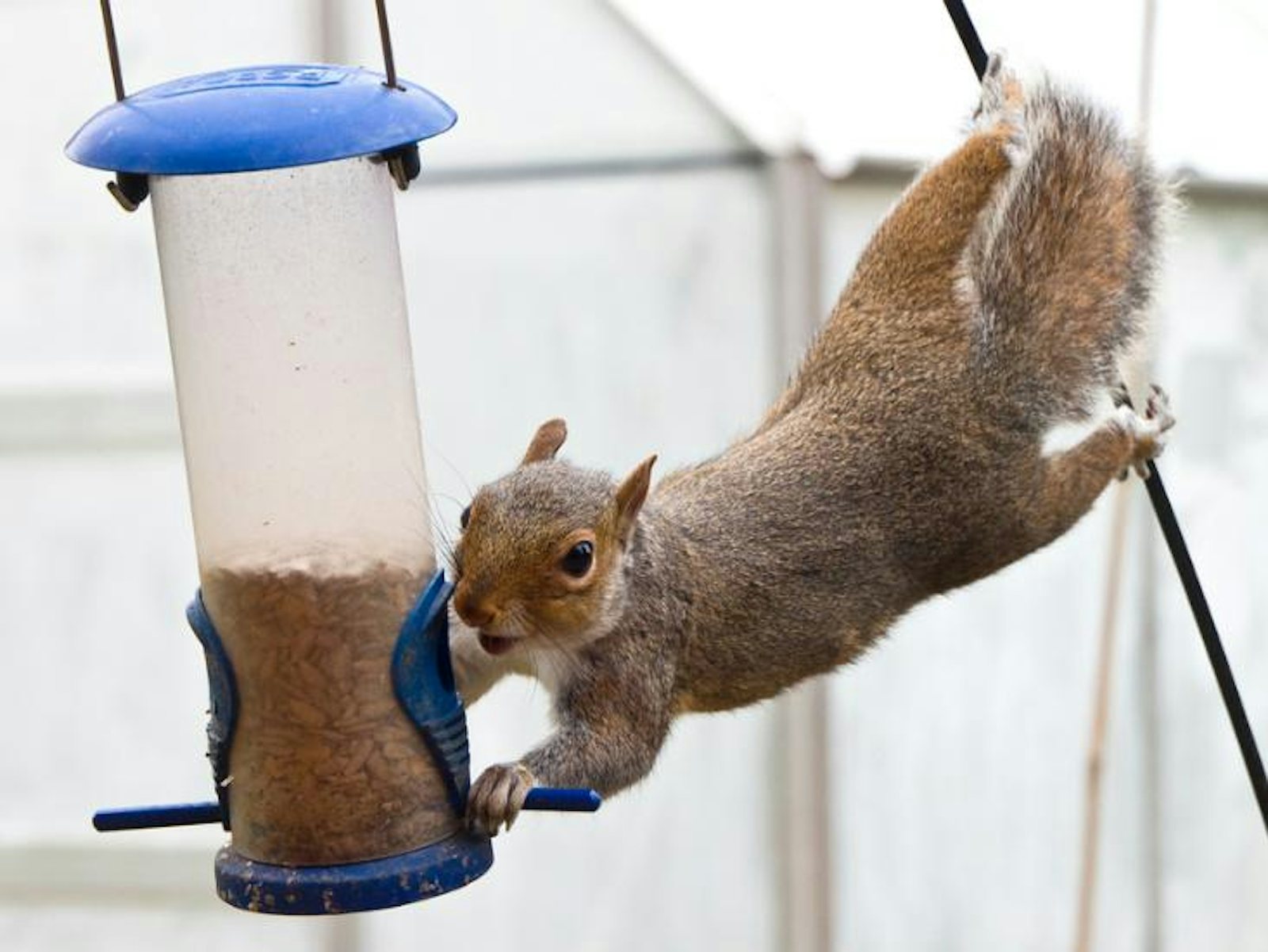
Feed the birds, they said. It will be fun, they said.
Early this spring I bought a simple wood-and-plastic bird feeder. My children and I filled it with feed that promised to lure colorful birds, hung it from a tree in the front yard within view of the kitchen window, and waited. A few weeks later the birds arrived. Blue jays, robins, chickadees, cardinals, orioles, and wrens flew in, flitted down, and pecked at food. My children were delighted, and so was I.
On the fourth morning I spotted a squirrel. Brown and gray with a white belly and an anxiously darting, reddish tail, it crept up the tree, and stopped on a branch just above the feeder. Grabbing the branch with its hind legs, the squirrel flipped upside-down and rappel-stretched down to the feeder’s opening. “Oh, look at the cute, little squirrel,” I thought, “It wants some food too.” Within a few minutes the feeder was on the ground, battered and broken.
After piecing together the feeder several more times, only to have a squirrel dismantle it within hours, I hopped online to find a more squirrel-resistant version. Many feeders looked promising. At least some reviewers called each one of them junk.
The feeder with the cage around it? Squirrels chewed through the bars or shook out the seeds. The one that closes down when something heavy pushes on the perch? Squirrels hang off of one perch to get at the others. Hang it from a string? Strings are a squirrel’s invitation to play. Want a shepherd’s hook? The squirrel just climbs the pole or jumps up from the ground. Maybe if we put out food for the squirrel? The squirrels don’t only get full; they get more plentiful.
It was about this time that I proposed writing about my struggle to my editor. I would pit my intellect against a rodent’s. Of course, ultimately, I, a super-intelligent Homo sapiens, would prevail. Somehow my editor agreed, and I set off with my wits and my deadline.
I ran upstairs and suddenly I was closer to a squirrel than I have ever had been before. It was climbing the screen of a lower window to get to the feeder, indifferent to the large canine predator through the glass.
The eastern gray squirrel is native to the eastern half of the continental United States and some of the southernmost parts of Canada, and it has more recently set up shop in some parts of the western U.S. and Europe. (See “Clash of the Tiny,” the story about how a close relative of the eastern gray invaded California, bringing it nose to nose with the native squirrels there.) It has adapted well to urbanization. Eastern grays are omnivorous, eating nuts, berries, and flowers, but also frogs, birds, eggs, and even other squirrels in times of food scarcity or disputes.
Sadly, little research has been devoted to learning the extent of squirrels’ mental faculties. It’s well-known that they have keen memories for the locations of hidden nuts and the best food sources. One recent article in the Journal of Zoology found that urban squirrels run away from people sooner if they approach while making eye contact or while they’re deviating from customary paths, both of which are signs that the humans might be aggressive. (You can see the research summarized in this silent–movie depiction.) Squirrels also seem to think about what other squirrels are thinking: Researchers have watched the animals pretend to hide food, or hide and then move food later on, if other squirrels are looking their way. For an animal with a walnut-sized brain, the squirrel is admirably clever.
But not more clever than me, right? In an effort to give the squirrels a sporting chance, I decided I could no longer use the collective wisdom of the Internet. This was supposed to be the local squirrels’ battle of wits against me, not against humanity. For similar reasons, asking friends would be forbidden.
At first I considered building a feeder myself, but I quickly realized that this would be inadvisable in a house with two small children. Do you know what looks like confetti and candy to small children? Screws. Know what else they really love? Saw blades. There would be no way I could both build a feeder that deterred squirrels and keep my children out of the ER. As a compromise I allowed myself manufactured feeders, but the design had to be something that I came up with. So if I thought to myself, “Hey, let’s put a cage around it,” I could then look for and buy one of those.
Finally I sat down and tried to work it out. Cages were out, as were umbrella attachments and strings. I was warned against using cages in online reviews (read before I decided that was cheating). Strings and upside-down umbrella “baffles” I’d seen circumvented in neighbors’ yards. I thought about getting a long, vertical pole, plopping a feeder on top, and putting some kind of lube on the pole, but it would probably wear off and poison the grass. I needed something that suctioned to the window. Do they make those? Indeed, they do.
It was a simple design: a clear plastic house, open at each end, with suction cups at the back. I stuck it to our front window. After several weeks, the birds arrived. Again, they were glorious. A few days later, I was downstairs working when I heard my Labrador trying to destroy something in the kitchen. I ran upstairs and suddenly I was closer to a squirrel than I have ever had been before. It was climbing the screen of a lower window to get to the feeder, indifferent to the large canine predator through the glass. It was so close that I could count its ticks (four). Banging on the window did nothing. The squirrel continued its climb, hopped up into the feeder and helped itself.

By the third day, the feeder was broken. Really? Would I really lose a battle of wits to a rodent? I decided to move the suction feeder higher up, further from the screen, to see what the squirrels would do. After that, I’d have to try the lube.
By this time, it had become late summer. I set up the feeder in its new location, and I waited. And waited. No squirrels came, but no birds came either. I put out calorie-rich suet. Nothing. We went on a vacation and came back. No activity.
That’s when I realized what had changed. I hadn’t seen any squirrels—or birds or mice or chipmunks. I did see a new neighbor we had gained over the summer: a cat had moved in with a nearby family.
I considered what I would say to my editor if that cat had chased away my whole story. “Can I have an extension on that deadline, please? You see, there’s this cat…” Somehow my ability to get my job done now depended on the desires of a notoriously fickle domestic animal. I did not feel very smart.
In desperation, I found some new, fresh birdseed, filled the feeder to the brim, and convinced my kids that chasing the cat was a great new game. And what do you know, the birds came back, and the feeder is still up.
I have seen a squirrel or two try and fail to jump to the feeder from a nearby bush, but honestly, it looks more show than effort. The squirrels’ lackadaisical attempts are perhaps understandable: It’s fall now and the ground is covered with seeds and acorns. Why should they care about my somewhat-harder-to-obtain offerings?
For now, I suppose we are at a draw. I will have to see if the coming winter provides enough motivation to the squirrels to try harder. I’d like to say that I’m smarter than a squirrel, but I can’t claim victory until I know they are really trying.
I have since been talking to people about how they repel squirrels from feeders. Some employ electrified wires (ouch!). Others use a spinning perch. Feed laced with hot-pepper spice is an ingenious trick. It works because pepper plants have evolved a chemical (capsaicin) that feels painfully hot to mammals but inoffensive to birds. It seems the plant is choosing whom to feed itself to: It’s better for the pepper if its fruits get eaten by birds, which eat and poop the seeds out whole, than if they get eaten by mammals, which chew up and destroy the seeds.
It’s humbling that perhaps the best defense against squirrels comes not from us super-intelligent humans, but from plants. Slow-moving, toothless, brainless plants. Forget about being smarter than a squirrel—I’m not smarter than a pepper. In my defense, plants have been working at driving off bothersome rodents for far longer than I have. Evolution: surpassing human intelligence ever since, well, it created us.
Epilogue:
After I filed this story, I bought another cheap plastic feeder and hung it from a column on the front of the house, a spot difficult for squirrels to access. I don’t know how they did it, but I recently found the feeder on the ground, in pieces. Seed husks blew all over the yard. The buggers.
Jenny Morber is a freelance science writer based in Fairfax, Virginia.






























